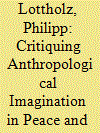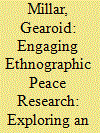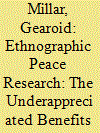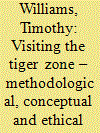|
|
|
Sort Order |
|
|
|
Items / Page
|
|
|
|
|
|
|
| Srl | Item |
| 1 |
ID:
161140


|
|
|
|
|
| Summary/Abstract |
This article seeks to show how the ethnographic peace research agenda can benefit from long-standing discussions in the anthropological literature. It sets out by arguing that the ‘anthropological imagination’ apparent in recent debates in peace and conflict studies is informed by an empiricist positivism that conceives of ethnography as a data-gathering tool. By drawing insights from the ‘writing culture’ and ‘Third World feminism’ debates, I will show how such empiricism was challenged and partly done away with in favour of new dialogical and collaborative approaches to knowledge production. In the second part, focussed on the context of the Kyrgyz Republic in Central Asia, I will illustrate the limits and blind spots of the prevalent empiricist approach to studying peace and conflict by showing how discourses and imaginaries of a ‘culture of peace’, tolerance and multiculturalism conceal forms of exclusion, marginalization and hidden conflict. I will show how my own collaborative research sheds light on community security practitioners’ efforts to understand and tackle security challenges. This practico-discursive analysis exemplifies how critical ethnographic peace research can help to uncover patterns of conflict management, post-conflict governmentality, and the construction and ‘othering’ of group identities.
|
|
|
|
|
|
|
|
|
|
|
|
|
|
|
|
| 2 |
ID:
161135


|
|
|
|
|
| Summary/Abstract |
As has been thoroughly rehearsed in the literature, the failures of the liberal peace model of post-conflict intervention have given rise to a ‘local turn’ in peace research. This in turn has refocused attention away from the motivations and practices of international actors towards local ownership and ‘buy-in’, and the importance of culture, context, and ‘the Everyday’. There is a mismatch, however, between the methodological skills among peace researchers today, and the new imperative to explore local and everyday understandings, perceptions, and experiences of conflict, transition, and peace. For this reason a number of scholars have recently emphasized the importance of incorporating ethnographic methods and an anthropological imagination into peace research. However, at this point, and as evidenced in the contributions to this special issue, there are many challenges to such incorporation which must be acknowledge and addressed if the ethnographic approach is to fulfil its early promise to add empirical substance to the local turn. The contributing authors each address different challenges to conducting Ethnographic Peace Research (EPR) in post-conflict contexts and, as this introduction argues, they evidence clearly the variety of questions yet to be answered while suggesting different ways ethnographic approaches can be incorporated into peace research.
|
|
|
|
|
|
|
|
|
|
|
|
|
|
|
|
| 3 |
ID:
161138


|
|
|
|
|
| Summary/Abstract |
While Peace Studies has always incorporated different research methodologies, large-N quantitative methods and state-level findings have dominated the literature and had most influence on policy and practice. Today, however, the limitations of peace interventions are commonly identified with the institutional, state-centric, and technocratic approaches associated with such limited understandings and their resultant policies. This paper argues, therefore, that the inability of these methods to examine local experiences of conflict, transition, and peace in diverse sociocultural settings contributes to inadequate policy formation and, thus, to problematic interventions. Indeed, the recent ‘local turn’ and its focus on the everyday, resistance, hybridity, and friction demands research that can better interpret local experiences of conflict, transition, and peace and, thereby, discover more locally salient practice. While this paper argues that an Ethnographic Peace Research (EPR) agenda must be central to such efforts, it also argues against applying the ethnographic label to work that is more suitably described as qualitative (site visits, interviews, focus groups, etc.). The paper argues that long-term fieldwork and close engagement with the subjects of peacebuilding must be required within any EPR agenda. The underappreciated benefits of such fieldwork are illustrated with examples from research in northern Sierra Leone.
|
|
|
|
|
|
|
|
|
|
|
|
|
|
|
|
| 4 |
ID:
161139


|
|
|
|
|
| Summary/Abstract |
In this article, I focus upon the notion of suspicion as a lens to better understand the distinct challenges that local researchers from the Global South encounter in ethnographic fieldwork when studying peace and peacebuilding in the context of active armed conflict within their countries. Over the last decade, scholars have increasingly deployed ethnographic approaches to better understand peacebuilding, devoting careful attention to local actors and processes that shape the practices and outcomes of international peacebuilding efforts in post-conflict environments in the Global South. While this local turn in Peace Research has led towards a renewed awareness of the challenges in ethnographic fieldwork in situations of war, armed conflict and political violence, most of the conversations in the emergent Ethnographic Peace Research (EPR) literature focus upon and draw from the experiences of researchers from the Global North who conduct ethnographic research in the Global South. Begging to be considered in the EPR literature are the experiences of local researchers from the Global South who are immersed in ethnographic research in their countries, and what these experiences tell us about the differential politics in ethnographic research.
|
|
|
|
|
|
|
|
|
|
|
|
|
|
|
|
| 5 |
ID:
161136


|
|
|
|
|
| Summary/Abstract |
This article is a methodological, conceptual and ethical reflection on challenges and opportunities afforded to ethnographic researchers in the field when working with perpetrators of mass violence and their motivations. Departing from a research project on the motivations of former cadres of the Khmer Rouge and fieldwork conducted on this topic in Cambodia, various possible approaches to conducting such ethnographic research are discussed, focusing on long-term stays in the community, frequent visits and building networks in the community, and repeat individual visits to select people without embedding oneself as a researcher in the community. For each of these approaches their distinct strengths and limitations are considered in light of various methodological, conceptual and ethical challenges encountered by the author in the field. As such, this article does not suggest specific methodological developments but offers a critical reflection of how various approaches to an ethnography of perpetrators can variously deal with these challenges.
|
|
|
|
|
|
|
|
|
|
|
|
|
|
|
|
| 6 |
ID:
161137


|
|
|
|
|
| Summary/Abstract |
This contribution suggests how to identify and deal with ex-combatants in (un)peaceful post-war environments from a methodological perspective. While it is obvious that large-N studies or standardized interviews fall too short to depict post-war dynamics and related conflict risks, ethnographic methods face numerous challenges, too. First, the identification of and access to former combatants may prove to be difficult. Often being stigmatized or perceived as outlaws they may not wish to get in touch with ‘outsiders’, like academics. Second, researchers need to be careful not to worsen the status of ex-combatants and at the same time make sure to maintain a trustful relationship with the rest of the community. Moreover, certain ethics apply when addressing sensitive war or contemporary issues (e.g. land grabs), even more, if there is a lack of amnesty. I aim at critically discussing questions of trust, legitimacy, networks, the necessity of ‘going local’, as well as logistics that can exacerbate dealing with ex-combatants or even pose a threat to researchers. Before concluding, I briefly delineate dilemmas related to the researcher’s role and her responsibility for field assistants. The article largely draws on my extensive ethnographic fieldwork experience in Cambodia and ethnographic literature on (post-)war settings.
|
|
|
|
|
|
|
|
|
|
|
|
|
|
|
|
|
|
|
|
|